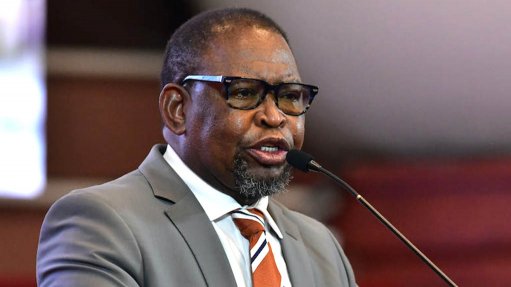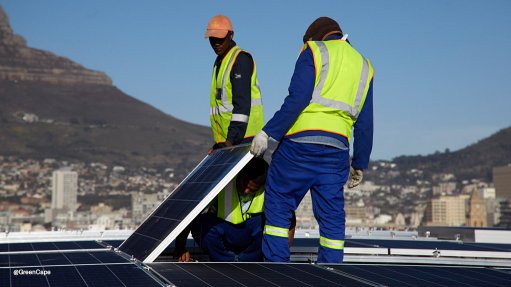Update on the state of COVID-19 lockdown on the South African mining industry
This article has been supplied as a media statement and is not written by Creamer Media. It may be available only for a limited time on this website.
On 15 March 2020, the Minister of Co-operative Governance and Traditional Affairs, as designated in terms of section 3 of the Disaster Management Act 57 of 2002 ("DMA"), declared a state of emergency in the Republic of South Africa, in terms of section 27(2) of the DMA.
On 23 March 2020, President Cyril Ramaphosa announced that a nation-wide lockdown of 21 days would be implemented in South Africa, with effect from midnight on 26 March 2020 and ending on midnight on 16 April 2020, as a measure to curb the spread of COVID-19. In an address to the nation on 9 April 2020, the President announced that the nation-wide lockdown would be extended by a further 2 weeks, due to end on 30 April 2020.
In his initial address and in relation to mining, the President said that “companies whose operations required continuous processes such as furnaces and underground mine operations were required to make arrangements for care and maintenance, to avoid damage to their continuous operations”.
The Minister of Cooperative Governance and Traditional Affairs has since published regulations (“Lockdown Regulations”) to the DMA. The Regulations were made to prevent, alleviate, constrain or minimise the effects of the COVID-19 pandemic. The Lockdown Regulations provide, amongst others, that:
-
All businesses and other entities shall cease operations during the lockdown, save for any business or entity involved in the manufacturing, supply, or provision of an ‘essential good’ or ‘essential service’;
-
Any place not involved in the provision of an essential good or service must remain closed to all persons for the duration of the lockdown;
-
The head of an institution must determine essential services to be performed by his institution, and must determine the essential staff that will perform those services and designate the persons performing those essential services in writing on a form prescribed in the regulations.
Under the Lockdown Regulations, fuel, including coal and gas are listed as essential goods whilst gold, gold refinery, coal and ‘essential mining’ are listed as essential services.
The term ‘essential mining’ is not defined in the Lockdown Regulations and therefore it is not clear what is contemplated by essential mining.
Proposed Measures by the Department of Mineral Resources and Energy
Pursuant to the President’s announcement, on 25 March 2020, the Minister for the Department of Mineral Resources and Energy ("Minister") announced that, amongst others, in respect of mining, the following measures were proposed for implementation:
-
Mining operations would be scaled down significantly, particularly deep level mining, which is labour intensive;
-
Essential services supporting the sector – including security and related infrastructure, maintenance, water pumping and ventilation, must continue;
-
Mines supplying coal to Eskom would remain in operation, albeit at reduced production levels;
-
For exports, each case will be evaluated on its merits;
-
Production in the gold, chrome, manganese and other sectors will be scaled down, while the processing of surface material in the platinum group metals (PGM) sector will continue for the production of, among others, medical products. This would allow smelters which cannot be switched on and off abruptly, to remain operational.
Most mines have hence been forced into care and maintenance operations for the duration of the lockdown period to ensure their workings do not deteriorate significantly.
In addition to the above, the Minister for the Department of Trade and Industry announced that all businesses providing essential services (as contemplated above) should seek approval from the Department of Trade and Industry in order for them to trade during the lockdown.
Mining companies that have remained open during the lockdown period and those that have been granted or applied for essential services permits to operate during the lockdown period are under a legal obligation to create and maintain a safe working environment for mine workers.
Compliance with the provisions of the Mine Health and Safety Act
Notwithstanding any operational concessions under the Lockdown Regulations and the measures proposed for implementation by the Minister, the mining sector and mining companies are under a specific and continued legal obligation to create and maintain a safe working environment for mine workers.
The primary legislation in South Africa regulating health and safety in the mining industry is the Mine Health and Safety Act, 29 of 1996 ("MHSA"). An employer is required under the MHSA to ensure, as far as reasonably practicable, that the mine is operated and maintained in such a way that employees can perform their work without endangering their own health and safety or that of any other person. Employers are also required to staff the mine with due regard to health and safety and to ensure the adequate supply of health and safety equipment. At the same time, the employer is under an overarching obligation to continuously assess and respond to risk, particularly where new hazards arise or work practices change.
COVID-19 is a clear ‘source of or exposure to danger’ and therefore constitutes a ‘hazard’ as defined under the MHSA. Accordingly, mines will be required to update their hazard identification and risk assessments to address the specific danger and risks of exposure to COVID-19 in the workplace. Once those risks are identified, the employer is obliged to implement measures, including any relevant engineering controls, to eliminate, minimize or control such risk. Where, notwithstanding those controls, a risk of exposure remains, the employer may provide appropriate personal protective equipment and institute a programme to continue to monitor the risk of exposure.
These obligations must also be considered in conjunction with the employer’s duties to implement any necessary occupational hygiene measures and medical surveillance to manage and minimize the possibility of exposure to COVID-19 in the workplace and the associated risks.
Aside from the obvious health and safety consequences, any failure to comply with these obligations may also result in the issuing of work stoppage instructions or orders in terms of section 54 and/or section 55 of the MHSA.
Consequently, mining companies in their capacities as employers must, as far as reasonably practicable, implement specific measures to combat and prevent exposure to COVID-19 in the workplace.
Recent updates
On 3 April 2020, the Department of Mineral Resources and Energy (“DMRE”) announced that:
-
There are currently three confirmed cases of Covid-19 in the mining and energy sectors – one each in Gauteng, Mpumalanga and Western Cape;
-
A number of mining right-holders have been applying to the DMRE for permission to continue operating, although at significantly reduced levels, in line with the Lockdown Regulations’ categorisation of essential goods and services during the lockdown period;
-
The DMRE undertook unannounced visits to three collieries in Mpumalanga – Exxaro’s Matla Coal operation, Glencore’s Impunzi Colliery and Seriti’s Kriel Colliery. These operations are among those supplying coal to Eskom. The purpose of the visits was to assess compliance with directives and guiding principles issued to mines on how to manage and prevent the spread of COVID-19.
Mining companies such as Implats and Sibanye-Stillwater have announced that their South African mining operations will be on mandated care and maintenance during the lockdown period.
Other than coal mines, Anglo American was the only major mining company to announce that some of its South African operations (Kumba Iron Ore, Mogalakwena Mine and the mechanised Mototolo Mine, De Beers’ Venetia Mine and Isibonelo Mine) will remain open, albeit at reduced workforce and production levels, during the lockdown period.
On 8 April 2020, it was reported that the DMRE has issued Eastern Platinum with an essential services permit, pursuant to which it has authorised Eastern Platinum’s subsidiary Barplats Mines to operate its tailings retreatment project at a reduced capacity and to transport and export the chrome concentrate produced.
With two weeks into the lockdown and given the extension of the lockdown period until 30 April 2020, there is increasing pressure to know whether mines (including non-essential service mines) should be permitted to operate.
On 9 April 2020 the media reported that the Minister met with the Minerals Council South Africa (“Minerals Council”) and some unions on 8 April 2020 to discuss available options in the event the lockdown is extended and that the DMRE, the Minerals Council and some unions have agreed in principle that 60% to 70% of the mine labour force will go back to work on 16/17 April, with protocols in place to contain the spread of COVID-19. Following the media reports, the Minerals Council released a statement noting the media reports and confirming that the Minerals Council has been engaging with the DMRE and unions in recent days to establish a way forward on how to work safely under the constraints of COVID-19. Notwithstanding this, in his address on 9 April 2020, the President did not mention whether any restrictions would be lifted in respect of mining companies, but stated that government would “use the coming days to evaluate how we [it] will embark on risk-adjusted measures that can enable a phased recovery of the economy, allowing the return to operation of certain sectors under strictly controlled conditions”.
In light of the President’s address on 9 April 2020 and the extension of the lockdown until 30 April 2020, there is a possibility that certain mining companies may be permitted to resume operations, albeit under strictly controlled conditions. What is clear is that when mining companies do resume operations, they will need to be fully prepared to deal with the risk posed by COVID-19 to their workforce and businesses.
Although it is still early to fully understand the impact the COVID-19 pandemic will have on the mining industry as a whole, the COVID-19 pandemic has clearly caused a period of extreme uncertainty in the industry.
Fasken
Comments
Press Office
Announcements
What's On
Subscribe to improve your user experience...
Option 1 (equivalent of R125 a month):
Receive a weekly copy of Creamer Media's Engineering News & Mining Weekly magazine
(print copy for those in South Africa and e-magazine for those outside of South Africa)
Receive daily email newsletters
Access to full search results
Access archive of magazine back copies
Access to Projects in Progress
Access to ONE Research Report of your choice in PDF format
Option 2 (equivalent of R375 a month):
All benefits from Option 1
PLUS
Access to Creamer Media's Research Channel Africa for ALL Research Reports, in PDF format, on various industrial and mining sectors
including Electricity; Water; Energy Transition; Hydrogen; Roads, Rail and Ports; Coal; Gold; Platinum; Battery Metals; etc.
Already a subscriber?
Forgotten your password?
Receive weekly copy of Creamer Media's Engineering News & Mining Weekly magazine (print copy for those in South Africa and e-magazine for those outside of South Africa)
➕
Recieve daily email newsletters
➕
Access to full search results
➕
Access archive of magazine back copies
➕
Access to Projects in Progress
➕
Access to ONE Research Report of your choice in PDF format
RESEARCH CHANNEL AFRICA
R4500 (equivalent of R375 a month)
SUBSCRIBEAll benefits from Option 1
➕
Access to Creamer Media's Research Channel Africa for ALL Research Reports on various industrial and mining sectors, in PDF format, including on:
Electricity
➕
Water
➕
Energy Transition
➕
Hydrogen
➕
Roads, Rail and Ports
➕
Coal
➕
Gold
➕
Platinum
➕
Battery Metals
➕
etc.
Receive all benefits from Option 1 or Option 2 delivered to numerous people at your company
➕
Multiple User names and Passwords for simultaneous log-ins
➕
Intranet integration access to all in your organisation





























